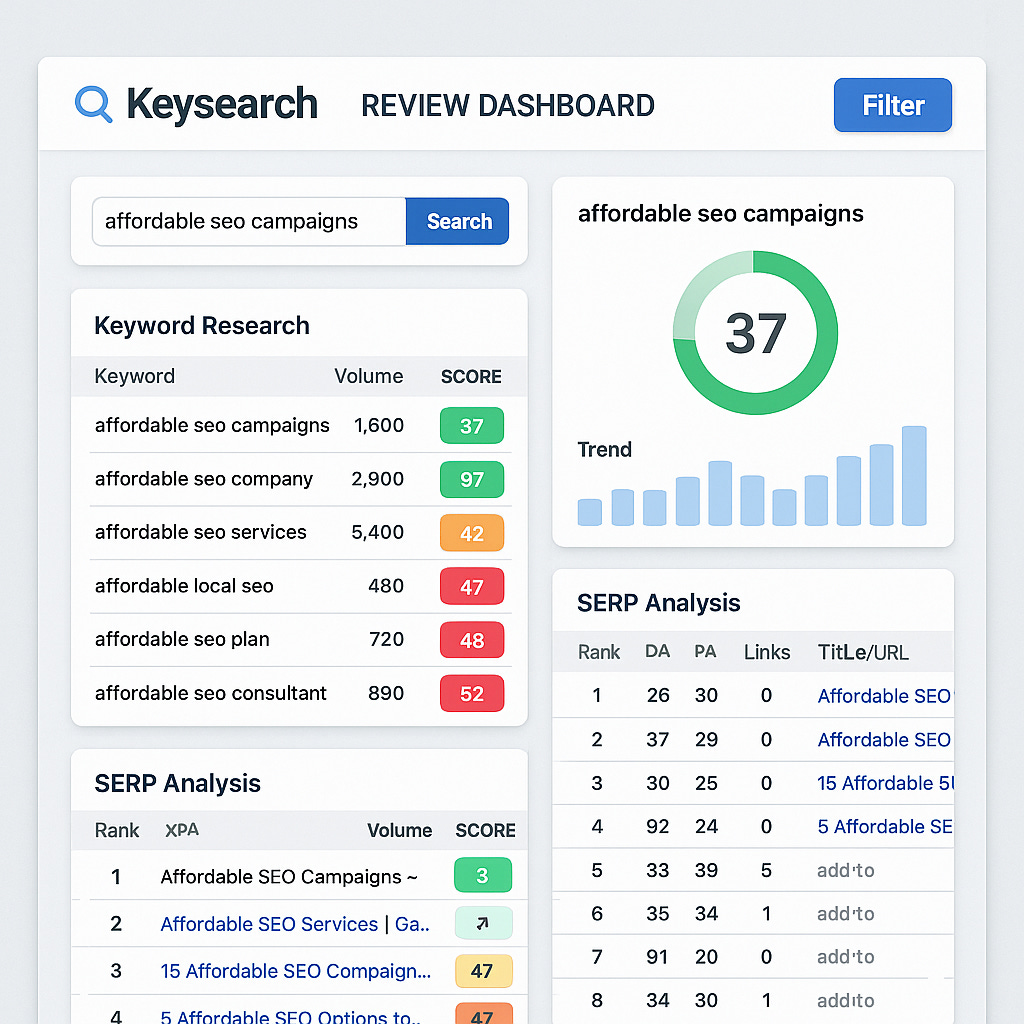Keysearch Review: Crush Rankings on a Budget
Read this KeySearch review to see how this affordable SEO tool can help you rank faster, find hidden keywords, and beat premium competitors without breaking the bank.
If you’ve been searching for an honest Keysearch review to determine if it can help you rank higher without draining your wallet, you’re in the right place. It’s frustrating when popular SEO tools bury you in data overload, expensive subscriptions, and feature creep you’ll never fully use—leaving you overwhelmed and no closer to ranking. Keysearch offers a streamlined, budget-friendly alternative packed with research firepower that helps you laser-target the right keywords, spot competitor weaknesses, and organize your content strategy for maximum results.
In this in-depth Keysearch review, you’ll discover how it empowers you to confidently conquer search rankings with clarity and precision.
Why Traditional Keyword Tools Leave You Stranded
Too many keyword research platforms prioritize flashy dashboards and endless metrics while ignoring what really matters: surfacing keywords you can actually rank for, given your current resources.
When you’re faced with steep domain authorities, saturated niches, and competitors with huge backlink profiles, these generic keyword scores just don’t tell the whole story. As a result, your time, budget, and even your enthusiasm can take a huge hit when rankings never materialize.
Keysearch challenges this status quo by providing a data-driven keyword difficulty evaluation that includes on-page optimization elements, backlinks, and real-world search trends, giving you a sharper, more practical path forward.
How Keysearch Empowers You to Win the Ranking Game
Unlike many bloated platforms, Keysearch focuses on actionable research, practical keyword clustering, and SERP intelligence that reveals hidden weaknesses among your competitors. Its scoring model considers factors like keyword-in-title presence, internal linking strength, and content quality signals—features that let you target opportunities where you can win even in tough markets.
Rather than wasting weeks chasing impossible targets, you can identify reachable keywords, plan smart content silos, and build a topical authority structure that Google rewards.
Featured Snippet Optimization
Q: Can Keysearch help me target featured snippets?
Yes—the built-in SERP analyzer highlights answer boxes, People Also Ask results, and snippet patterns so you can reverse-engineer the exact content types that Google prefers for top results. This allows you to structure your own articles with schema markup, FAQ blocks, and concise paragraph answers to increase your snippet visibility.
Deep Keyword Clustering for Long-Term Topical Authority
Modern SEO is not just about single keywords. Google rewards topic clusters and semantic relevance. Keysearch allows you to organize keywords into logical groups tied to a central theme, making it easier to build authority on a subject.
For example, you can group long-tail keywords around “affordable SEO tools,” “SEO keyword research platforms,” and “YouTube keyword research” into a single content hub, interlinking each piece to strengthen your site’s thematic signals.
This approach works far better than scattering random posts with no structural coherence—and Keysearch supports this strategy right out of the box.
The SERP Analyzer: A Tactical Overview
One of the strongest features highlighted in any Keysearch review is the SERP analyzer. Rather than showing only the top-ranked domains, it breaks down ranking signals, including
keyword in titles and meta descriptions
domain authority
backlinks
page load speed
schema usage
internal linking
These data points offer a holistic understanding of why a page ranks, empowering you to emulate—or surpass—those elements. This tactical view helps you avoid “blind” keyword chasing and build a concrete, data-backed action plan.
Competitor Research Beyond Link Counts
Many SEOs still judge the landscape by backlink counts alone. In practice, that’s a limited view because you might overlook weak content, outdated pages, or thin internal link structures.
Keysearch’s competitor research goes deeper. It reveals:
missing keywords in their content
outdated or broken outbound links
content freshness gaps
weak on-page signals
These overlooked vulnerabilities become your strategic entry points to outperform them—even if you’re working with fewer links or a smaller budget.
YouTube Keyword Research: A Powerful Bonus
Video is dominating the search ecosystem, but traditional SEO tools rarely handle it well. Keysearch includes a dedicated YouTube keyword research module, allowing you to
discover high-traffic, low-competition video topics
analyze video-specific difficulty
compare engagement signals
This helps creators optimize thumbnails, descriptions, tags, and titles with the same precision as text-based SEO, a massive advantage if you’re expanding to video content.
Professional Reporting Features for Agencies
If you handle client SEO, reporting can be a nightmare. Keysearch provides white-label reporting features, so you can quickly generate client-friendly keyword reports, SERP insights, and competitive opportunities under your own branding.
This makes it easier to communicate your strategy, back it with data, and look professional without spending hours in spreadsheets.
Addressing Potential Shortcomings
No Keysearch review is complete without fair caution:
Its backlink index is smaller than giants like Ahrefs. If you do extensive backlink audits, you may want to supplement with another link-focused tool.
The UI design feels a bit dated, though its speed and stability are excellent.
For most users—especially bloggers, affiliate marketers, freelancers, and budget-conscious agencies—these trade-offs are far outweighed by its practical functionality and affordability.
Frequently Asked Questions
Is Keysearch good for beginners?
Answer: Absolutely. Keysearch balances simplicity with advanced features, making it ideal for beginners who want intuitive keyword research without an overwhelming learning curve.
How much does Keysearch cost?
Answer: Plans start at around $17 per month, making it dramatically more affordable than enterprise-level keyword platforms.
Does Keysearch work for local SEO?
Answer: Yes. You can analyze localized keywords, check local SERPs, and identify region-based opportunities with Keysearch’s location filters.
Structured Data Opportunities
Keysearch can help you plan for structured data (schema), including FAQ blocks, reviews, and how-to content, all of which improve your odds of appearing in enhanced SERP features. When combined with the SERP analyzer’s data on rich results, you can design content that satisfies both user intent and search engine preferences.
Why Keysearch is Worth Considering Right Now
Keysearch positions itself as a lean, hyper-focused keyword and SERP analysis tool that puts strategy ahead of unnecessary bells and whistles. By surfacing rankable opportunities, revealing your competitors’ overlooked gaps, and providing a clear path to topical authority, it gives you a realistic, sustainable SEO framework without the financial burden of premium suites.
If you’re a solo creator, blogger, agency, or freelancer tired of overhyped software that complicates your process, Keysearch is an excellent alternative that delivers exactly what you need to move the ranking needle.
Your Next Move
Ready to take your SEO campaigns to the next level without breaking the bank? Consider giving Keysearch a test run today. Its balance of keyword research precision, SERP intelligence, and competitor insights offers a refreshing change from bloated tools—and it just might be the confidence boost your content strategy needs.
👉 Explore Keysearch now and discover how easily you can transform keyword chaos into ranking clarity.
About the Author:
My name is Stephon Anderson, and I'm the creator of the Affiliate Marketing Dojo. Just a few years ago, the idea of earning a full-time income from my blog felt like a distant dream. I spent countless hours sifting through generic advice, trying to separate what actually works from what doesn't.
Through relentless testing and a deep dive into what truly motivates readers and search engines, I built a system that turned that dream into my reality. As an affiliate marketer who has been in the trenches, I specialize in organic traffic and building content that connects and converts. I created this space to give you the clear, data-backed strategies I wish I had when I started, helping you bypass the noise and build your own path to a full-time blogging income.



